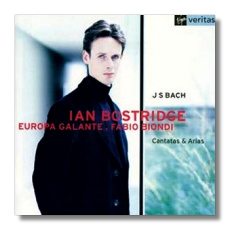
The Internet's Premier Classical Music Source
Related Links
- J.S. Bach Reviews
- Latest Reviews
- More Reviews
-
By Composer
-
Collections
DVD & Blu-ray
Books
Concert Reviews
Articles/Interviews
Software
Audio
Search Amazon
Recommended Links
Site News
 CD Review
CD Review
Johann Sebastian Bach

Cantatas
- Ich habe genug
- Ich armer Mensch, ich Sündenknecht
- Arias and Sinfonias
Ian Bostridge, tenor
Europa Galante/Fabio Biondi
Virgin Veritas 5 45420 2 DDD 67:55
In his excellent annotations to this release, Michel Roubinet notes that Bach tended to reserve the tenor voice for representations of abstract spiritual concepts and not for concrete expressions by individual members of the human race. The tenor stands aside, commenting on the action in the Passions from a raised vantage point, or speaking to and for all mankind about death, sin, forgiveness, and other core Christian issues.
Bostridge and Biondi take the listener on a kind of pilgrim's progress on this CD. It opens with Ich habe genug, an almost sensual embracing of death – "Death and the Maiden" for Baroque Lutherans. Bostridge sings, "I look forward to my death; How I wish it were already here" to music of the most joyful sweetness. It's music for unwrapping a Christmas present. (The present, of course, is redemption from sin.) From there, Biondi turns to a Sinfonia from Christ lag in Todesbanden as if to emphasize that even Christ had to die to pay sin's ransom. These sins are confronted head-on in Ich armer Mensch, ich Sündenknecht, the second full-length cantata on this CD, and the only cantata that Bach wrote for solo tenor. An aria from the so-called Trauer-Ode, written for a dead princess, again hints that the eternity heralded by death is a change to be welcomed after Earth's "dingy scene." The Easter Oratorio is represented by an aria stating that "Sweet shall my death agony be, Merely a falling asleep." Then the promise of God's forgiveness and comfort are given through arias from Christ unser Herr zum Jordan kam and Wohl dem, der sich auf seinem Gott. The disc ends with a jolly Sinfonia from the secular Peasant Cantata, which suggests the coming of an idealized Earth in Heaven to redeemed sinners. It brings this CD to a wonderfully naïve close. (Think of the vocal finale from Mahler's Fourth Symphony.)
There's clever programming here, then. Two complete cantatas and eight cantata movements might have caused chaos were it not for the underlying theme. Who would have thought that the sacred music of Bach could comprise a "concept album"?
The performances are outstanding. Bostridge sings with great expression and with an appreciation for Baroque style. He characterizes, but he doesn't overdo it. Try the aria from Wohl dem, der sich auf seinem Gott, where the word Spötter (mockery) launches his derisive laughter. Ich habe genug is sung tenderly, as one would sing to awaken a sleeping lover. Bostridge effectively varies his tone between recitatives and arias to point up the meaning of the texts. Biondi's Europa Galante is an effective, expressive foil for his vocalism. (The musicians performed these works together in July 2000 at the BBC Proms.) Biondi himself plays the solo violin parts in several of these works.
The good-sounding recording was made in Parma. In addition to Roubinet's annotations, texts and translations are included.
Copyright © 2001, Raymond Tuttle


















